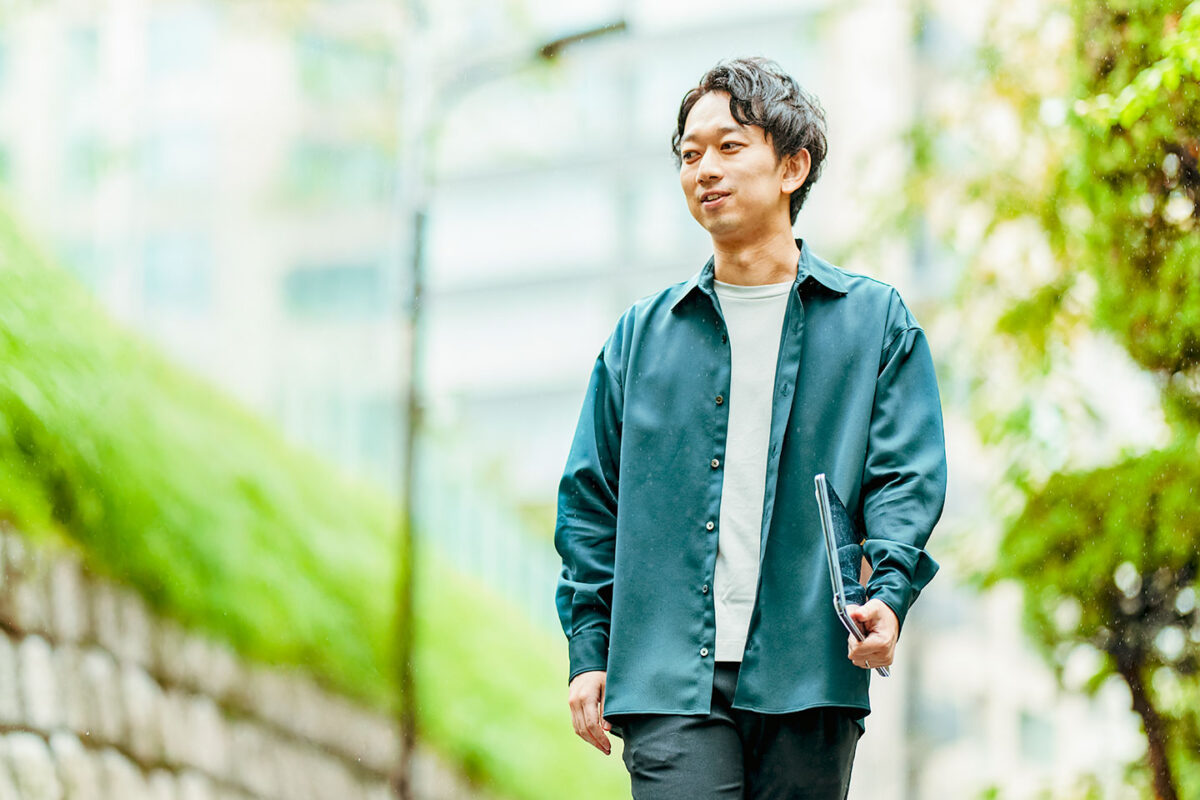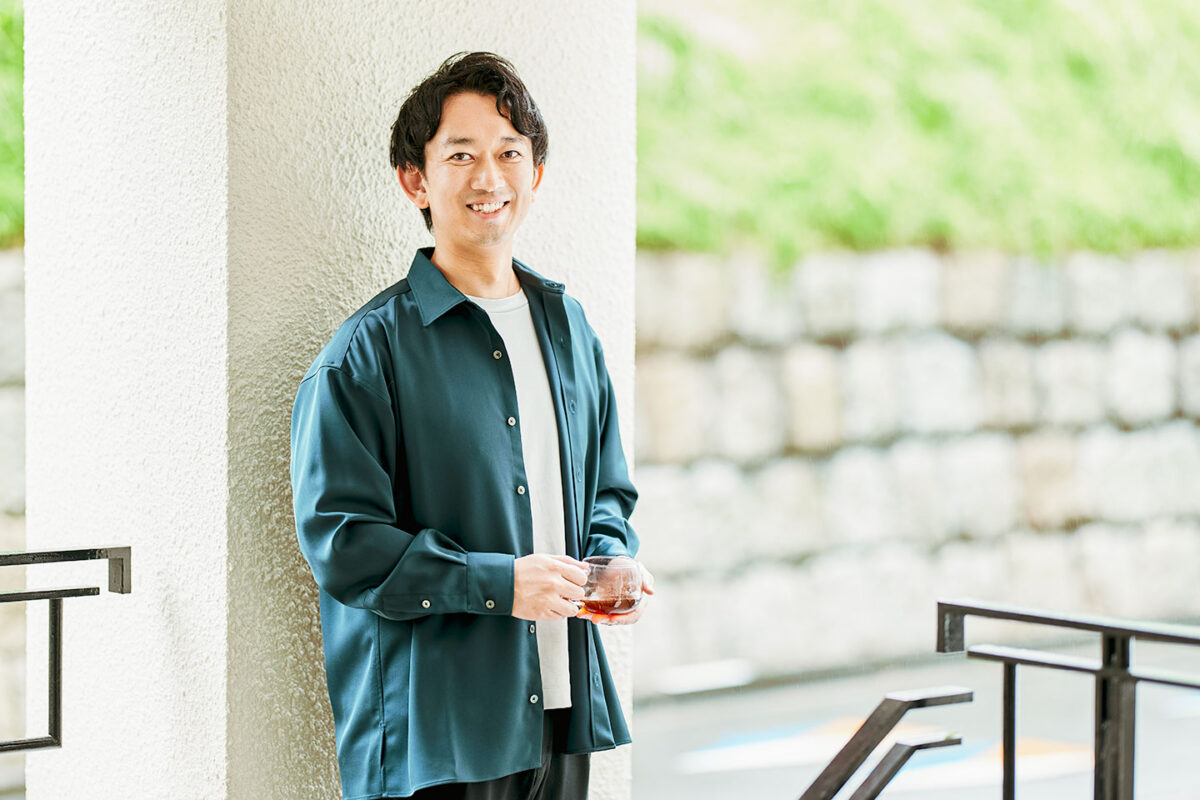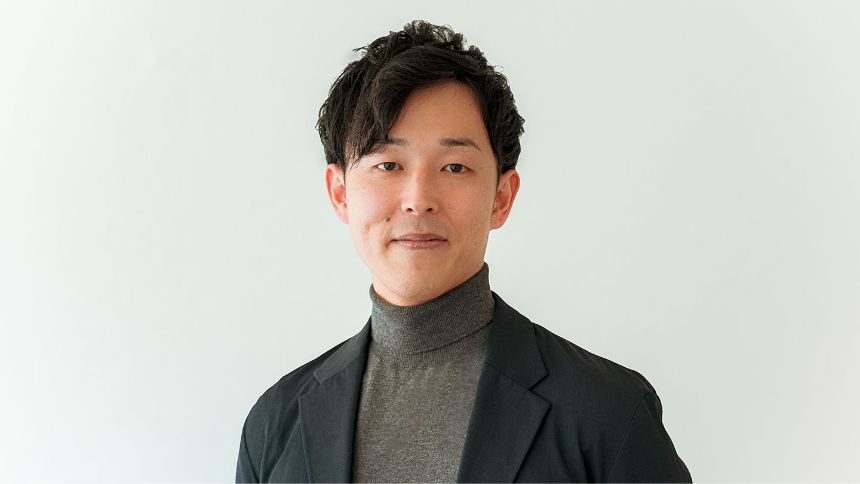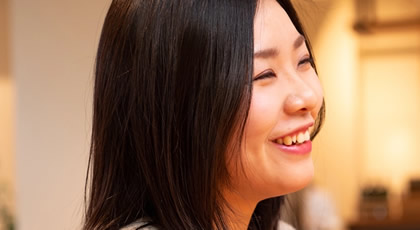
Not Someone Else’s Problem: Refusing to Ignore the Pain Beyond the Cup
In September 2024, TYPICA welcomed a new member to its corporate team: Hiroaki Hayashi, Director of Accounting.
After graduating from university, Hayashi spent about five years at an audit firm, where he reviewed financial statements of listed companies and helped pre-IPO companies build their organizational structures. He joined TYPICA to establish a solid corporate structure, aiming to contribute to its business growth and support a future IPO. In 2025, he plans to move with his wife and child to Osaka, where TYPICA’s corporate headquarters are located.
Ever since his college years, Hayashi wanted to be the backbone supporting a startup’s growth. Now, with eight years of accumulated experience and expertise, he has made that vision a reality by joining TYPICA. What’s on his mind now?

Taking matters into my own hands
When you work as a CPA at an auditing firm, you must follow strict guidelines during client audits: you cannot manipulate figures (intervene in accounting processes) or interfere with the company’s business policies. These rules exist to ensure CPAs remain impartial and independent.
Hayashi understood the importance of these regulations during his time at the audit firm, but he often felt frustrated. Just a step away, there were people in need – people he could help but wasn’t allowed to.
Hayashi realized that joining their team and addressing their issues from within would be faster and benefit everyone; yet, the rules stood in his way. He concluded that if he wasn’t content with that situation, he’d have to join a company directly engaged in business operations. With that decision, he ended his career at an auditing firm and started earnestly seeking a position at a startup.
He wondered if there was a company where he could help create something from the ground up with his expertise in accounting and organizational development. As he continued his job search for a few months, a recruitment agent introduced him to several companies, but none of them sparked his passion. They were all well-established startups poised for IPOs sooner or later, whether he joined them or not.

Then one day, the agent introduced him to TYPICA.
“I had a few reasons for my interest,” Hayashi says. “First, I learned that coffee producers are in a very vulnerable position because of the traditional coffee distribution system and volatile international prices. If people are suffering behind the coffee I enjoy, people who are continuously subjected to hardship with no way out, something must be done. I felt deeply aligned with TYPICA’s assertion that only by resolving this can we fully enjoy what we love.
Second, I was fascinated by how TYPICA is aiming to become rule-makers by revolutionizing the industry’s structure from its foundation. And finally, I’d been thinking about someday returning to Osaka, where my family has roots, and working there if possible. So it was like everything fell into place.”
From his first interview to receiving a job offer – a period of about one month – Hayashi focused exclusively on TYPICA, cutting off all communication with other companies. He diligently went through TYPICA’s articles, videos, features on staff members, and even read Soul Driven, a book series that portrays TYPICA’s journey to date, all of which was imbued with passion that further inspired him. In the interviews, he didn’t just meet with the management and employees; he also had multiple discussions with three representatives from the venture capital firms funding TYPICA. As he sensed their genuine dedication, his own enthusiasm naturally intensified.
“Normally, when CPAs go though job interviews, a lot of the emphasis tends to be on the candidate’s skill set and the growth stages of the companies they’ve been involved with, but TYPICA was different. The questions focused more on how deeply I sympathize with the company’s mission and how I want to contribute to it, and why. I felt they were more interested in who I am as a person.
It’s been a couple of months since I came on board, and so far I don’t feel any gap between my expectations before joining and the reality of working here. I’d assumed the foundational systems wouldn’t be fully in place. Actually, I’m surprised at myself for genuinely enjoying the work without any sense of obligation.
If we can secure larger funding, TYPICA can increase the distribution of green coffee beans and create new opportunities for the roasters and producers we work with. To make that happen, I want to first build frameworks and mechanisms that allow us to smoothly manage accounting and finance.”

Making a survival-driven career decision
Born and raised in the remote countryside of Ehime Prefecture, Hayashi walked 50 minutes each way to elementary school daily. During his junior high and high school years, whenever he hung out with friends, he’d cycle 30 to 40 minutes to meet them at a local shopping mall. Though life was peaceful and idyllic, there was something unfulfilling, and he started yearning to experience city life one day.
That said, he wasn’t entirely disconnected from the wider world. While in junior high and high school, Hayashi was a member of an educational organization called Labo Party. Through field activities like communication training and cross-cultural exchanges, along with study abroad and homestay programs, he had opportunities to interact with people of various ages, from other regions and countries.
For instance, the organization hosted camps twice a year during extended holidays like summer and winter breaks. Members nationwide would come together to deepen their relationships through Japanese-English bilingual skits and plays, as well as outdoor adventures. Hayashi frequently took on leadership roles, overseeing groups of 30 to 40 participants, ranging from preschoolers to high schoolers.
With that experience as a base, Hayashi used a program from the same organization to spend about a year studying in the United States when he was entering his third year of high school. After improving his English skills through real-world practice, he went on to attend Tokyo University of Foreign Studies.
At university, where many students aspired to careers directly connected to their language skills, Hayashi was something of an oddity: he set his sights on becoming a certified public accountant. Friends who knew him well felt the job didn’t suit his personality, but it was a pragmatic decision he arrived at after thoughtfully considering his future.
“Even then, there were talks that AI would soon replace interpreters and translators. So I considered a career combining language skills and something else. I thought that becoming a CPA, which requires two to three years to qualify, would increase my value because of its scarcity. I also felt that working behind the scenes, handling accounting and finance in a startup or venture firm where the CEO is aggressively pushing the business, would suit me better.”
After obtaining his CPA certification while still in university, Hayashi could’ve joined a startup immediately after graduation. Although this path was strongly encouraged during job fairs, his mind didn’t waver. He realized that without practical experience or understanding of how a business operates, he wouldn’t be effective. He thought it would be wiser to first gain experience at a listed company before moving on to a startup.

Recognizing weaknesses
Indeed, Hayashi has followed a career path much as he planned. For around three years, he gained experience auditing listed companies at one of the Big Four accounting firms. After moving to an auditing firm specializing in supporting startups through IPOs, he was involved in the public listings of two companies over a period of about 18 months. His strategic and down-to-earth approach to life is a lesson derived from his past failures.
Hayashi’s first major setback came during his high school entrance examinations. While in junior high, he aimed for a high school he was confident he could get into, considering his mock exam results. He had no particular goals or visions for after admission; he was motivated solely by the school’s high academic reputation and social prestige. Furthermore, he was spurred on by those around him saying, “You’ll definitely get in!” When he ended up failing, he was plunged into despair.
“Looking back, there were two or three critical reasons for my failure, such as low conduct grades because of my poor classroom behavior and a rebellious attitude toward teachers. But back then, I was so complacent that I didn’t even think about nipping the risk in the bud. I came to understand firsthand the danger of letting myself be swayed by others and making life decisions based on moods and vibes.”
At that time, he was only 15 years old. He didn’t have the resilience to immediately bounce back from the setback. He enrolled in the fallback high school he’d applied to, but the school’s environment didn’t fit him. Before long, Hayashi stopped attending classes and spent his time at home walking his dog and watching TV. Drifting through his days, Hayashi made sure only to meet the minimum attendance required to avoid failing the year.
Fortunately for Hayashi, his parents chose to quietly watch over him. As he heard afterward, his mother was worried about him skipping school and frequently sought his father’s advice. Each time, his father would say, “Hiroaki will figure things out and get back on track when he’s ready; we should leave it to him.”

His father’s foresight was spot-on. With the approach of his third year in high school, Hayashi finally made a move. Having idled away his days at home without much studying, he was beginning to feel that his life was at a dead end. Driven by an intense sense of urgency, he chose to change his surroundings to reform himself, deciding to study for about a year at an American high school with no other Japanese around.
“I had hardly studied English before, so on my first day at the American school, I couldn’t catch a single word. But there was no turning back. I threw myself into listening and speaking as best I could, and somehow my English improved without me even realizing it. So I don’t remember making any special effort.”
Habits are hard to break unless one makes a conscious effort to change them. Perhaps swept up in the excitement of experiencing city life for the first time at university, Hayashi attended the freshman welcome party of his university’s American football club. Egged on by upperclassmen, Hayashi impulsively decided to join on the spot. He had entirely forgotten the fact that he had no experience with the sport and wasn’t naturally athletic. It wasn’t until two or three months later that he snapped back to reality and decided to quit.
“I have countless other stories of failures; I could go on forever. I’ve always been the type to act first without considering the consequences. I was constantly scolded during my elementary and junior school years. If I didn’t like how a teacher taught, I’d stop paying attention and do something else. If I was told to do something I didn’t want to, I’d openly oppose it by saying, ‘No, I don’t want to.’ At home, my mother often told me to think before I speak and consider how others feel. To put the brakes on that impulsive part of myself, I’ve made an effort to think things through.
One reason I’ve wanted to be involved with startups is because I’m aware of my tendency to be easily influenced by others. Being around people who are passionate about creating something new and changing systems inspires me, and it’s fun.”

Pursuing happiness for all
It was during his final year of high school, while studying abroad in the US, that Hayashi’s father passed away. Having not yet fully outgrown his rebellious phase, he hadn’t shared any deep conversations with his father; the only image he had was that of a jokester. But when he heard from his father’s colleagues, subordinates, and family that he was very kind to everyone and someone who always trusted and empowered others, Hayashi learned a side of his father he hadn’t seen before.
“I guess I take after my father; I can’t ignore it when friends or acquaintances are going through hardship or sorrow. It’s only natural to help them, to lend an ear, do whatever I can. In that sense, even though the producers and roasters I connect with through TYPICA aren’t personal friends, since they are involved in the coffee I love, I can’t think of them as strangers. That’s why I got the urge to do something.”
During his time as a leader at Labo Party, Hayashi couldn’t help but reach out to kids who, because of their shyness, were left alone or felt out of place in the group. He believed that with 30 to 40 participants, everyone could surely find someone they could get along with, and he acted as a bridge to connect them, pursuing the happiness of all.
“It’s no exaggeration to say that I am who I am today thanks to Labo Party. Not only did I gain experience interacting with diverse people and being challenged by those interactions, but organizing programs, meeting certain requirements while making sure everyone enjoyed themselves, has benefited me in my professional life. It was also where I learned the fun of building something together.
All in all, I’m happy if I and people around me are happy. It’s not that I aspire to achieve world peace or anything, but I do wish for the circle of happiness to spread, even just a bit. By joining a global business like TYPICA, maybe the circle of ‘people around me’ has expanded greatly.”























